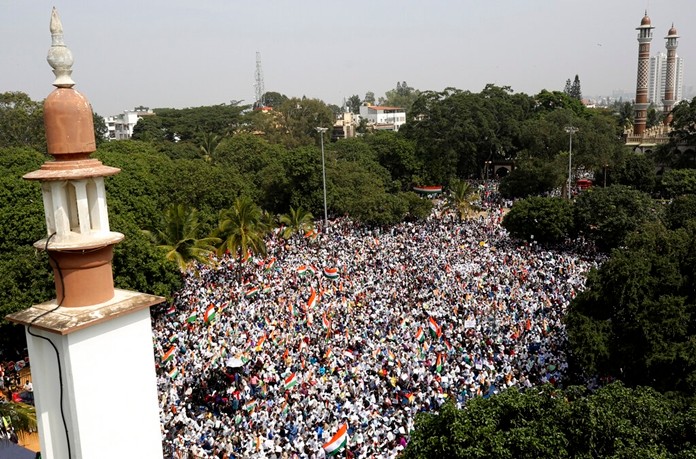
NEW DELHI (AP) — India’s main opposition party staged a silent protest in the capital on Monday against a contentious new citizenship law, a day after Prime Minister NarendraModi defended the legislation and accused the opposition of pushing the country into a “fear psychosis.”
About 2,000 people joined the protest at the Raj Ghat, a memorial dedicated to Mahatma Gandhi, where the Congress party demanded “protection for the constitution and the rights of people enshrined in it.”
Tens of thousands of protesters have taken to India’s streets to call for the revocation of the law, which critics say is the latest effort by Modi’s government to marginalize the country’s 200 million Muslims.
The law allows Hindus, Christians and other religious minorities who are in India illegally to become citizens if they can show they were persecuted because of their religion in Muslim-majority Bangladesh, Pakistan and Afghanistan. It does not apply to Muslims.
Monday’s protest was led by opposition Congress party chief Sonia Gandhi along with other senior leaders, including former Prime Minister Manmohan Singh. The leaders read out the preamble to the constitution at the protest site.
The party’s former president, Rahul Gandhi, had urged young people in New Delhi to join the protest.
“It’s not good enough just to feel Indian. At times like these it’s critical to show that you’re Indian & won’t allow to be destroyed by hatred,” Gandhi tweeted on Monday.
Other protests were held across the country on Monday, including in the southern cities of Bengalore and Kochi, where thousands came out on the streets against the law.
Twenty-three people have been killed nationwide since the citizenship law was passed in Parliament earlier this month in protests that represent the first major roadblock for Modi’s Hindu nationalist agenda since his party’s landslide reelection earlier this year.
Most of the deaths have occurred in the northern state of Uttar Pradesh, where 20% of the state’s 200 million people are Muslim. The state government is controlled by Modi’s governing BharatiyaJanata Party.
Police also seized some shops in the town of Muzaffarnagar in the state. The crackdown, which began Sunday, came after the state’s chief minister, Yogi Adityanath, vowed Friday to “take revenge” against people who damaged public property during the protests by seizing their assets.
The Uttar Pradesh government’s spokesman, Shalabh Mani Tripathi, said authorities were “working as per directives of the Supreme Court, which has asked that the damages to public property should be compensated by rioters.”
He did not say how the owners of the shops were identified as offenders.
Authorities across India have taken a hard-line approach to quell the protests. They’ve evoked a British colonial-era law banning public gatherings, and internet access has been blocked at times in some states. The Ministry of Information and Broadcasting has asked broadcasters across the country to refrain from using content that could inflame further violence.
The communication shutdown has mostly affected New Delhi, the eastern state of West Bengal, the northern city of Aligarh and the entire northeastern state of Assam.
Undeterred, protesters have continued to rally throughout the country.
Protests against the law come amid an ongoing crackdown in Muslim-majority Kashmir, the restive Himalayan region stripped of its semi-autonomous status and demoted from a state into a federal territory in August.
The demonstrations also follow a contentious process in Assam meant to weed out foreigners living in the country illegally. Nearly 2 million people, about half Hindu and half Muslim, were excluded from an official list of citizens — called the National Register of Citizens, or NRC — and have been asked to prove their citizenship or else be considered foreign.
India is building a detention center for some of the tens of thousands of people who the courts are expected to ultimately determine have entered illegally. Modi’s interior minister, Amit Shah, has pledged to roll out the process nationwide.
On Sunday, Modi denied the existence of a detention center, accusing the Congress party of spreading fear that Indian Muslims would be jailed there. He also contradicted Shah, saying that there had been no discussion yet of whether to execute a nationwide citizens registry.
The protests against the law began in Assam, the center of a decades-old movement against migrants, before spreading to predominantly Muslim universities and then nationwide.
 |
 |
 |





